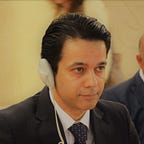Muslims Should Vote Trump?
--
He improved America’s ties with traditional Cold War allies in the Muslim world, pushed Arab-Israel peace forward for the first time in quarter-century, did not start new American wars in Arab and Muslim-majority regions, and made progress on Afghanistan and Iran.
This is an impressive laundry list of achievements for a first-time president and a first-time politician. In just four years.
President Donald J. Trump impressed everyone with his come-from-behind election victory in 2016 (I was not surprised because I was then the only TV talk show host in Pakistan’s noisy broadcast media that predicted his victory, and advised Pakistani- and Arab/Muslim-Americans to study the America-First impulse in American politics and respect it as a strong desire by many American citizens to restore American leadership in the world that gradually declined in the quarter-century since the end of Cold War in 1991).
Just like his first-time presidency, this is Trump’s first experience at re-election. Can he make it?
The Muslim world is closely watching the race, with mixed views.
But here’s why Pakistani-Americans and Arab/Muslim-Americans in general could vote Trump:
1. TRUMP DID NOT LAUNCH NEW WARS IN THE MIDDLE EAST.
If anything, Trump stopped America from getting involved in new wars, in Syria for example while staying firm on human rights violations by the Assad regime. And he refused to be dragged into a war with Iran, despite attempts by Iranian hardliners to provoke confrontation.
2. TRUMP ENDED REGIME CHANGE WARS.
For good or bad, President Trump dumped the failed policy of previous U.S. administrations to export American-style democracy to unstable states not ready for external nation-building projects. He replaced it with a constructive policy of engagement and win-win, with subtle encouragement on freedoms and human rights. This policy allowed several Arab and Muslim states to become less paranoid about foreign interventions and regime-changes and more receptive to engagement and conversation about broader issues that impact American interests and prosperity.
3. TRUMP REVIVED OLD ALLIANCES.
Many of America’s Cold War successes in a crucial region like the Middle East came from partnerships with allies like Egypt, Morocco, Jordan, Israel, Turkey, Saudi Arabia, and Pakistan. Many of these relationships withered in the past two decades. Trump revived these ties.
4. NUDGING ARAB-ISRAEL PEACE FORWARD.
Despite its strong support for Israel, America had been the world’s largest aid giver to Palestinians for more than half-century. American aid played a crucial role in helping hundreds of thousands of Palestinians receive education, medical care, and other services directly and through international development agencies. But Washington seldom received credit for this. Now, Trump has stopped unchecked U.S. aid to unaccountable Palestinian leaders. This was a controversial decision, but one that shifted much-needed scrutiny to Palestinian officials. These officials enjoyed years of corruption and self-enrichment, kept the Palestinian people impoverished, failed to build institutions for a future independent state, and pushed young Palestinians to violence to deflect their failures. For years, American administrations turned a blind eye to these practices by Palestinian leaders. And though some Israeli government practices merit scrutiny, the Trump administration created history by holding Palestinian leadership accountable. This will have positive consequences for Palestinian governance and possible statehood into the future.
5. HOLDING IRAN ACCOUNTABLE.
The nuclear deal with Iran, negotiated by the Obama administration and the big powers, was a step forward in peacefully resolving the impasse with Iran. But while it created an illusion of peace between Tehran and the West, it unleashed the most destructive elements of the Iranian religious system in the immediate neighborhood, emboldening extremists in the Khomeinist-led government in Tehran to destabilize neighbors through proxies and religious extremism. The JCPOA failed to hold Iranian leaders accountable for their actions in the region. In a way, the deal legitimized violent Shia (Iranian) jihadism in the region much in the same way that violent Sunni jihadism was legitimized in Afghanistan back in the 1980s and 1990s. The Trump White House took the lead in checking Iranian adventurism with considerable skill and restraint. Taking out Soleimani, exiting JCPOA, and avoiding a military confrontation with a trigger-happy Iranian Revolutionary Guards (IRGC) required skillful balancing that Trump managed well.
6. ENDING AFGHANISTAN WAR.
No American political or military leader showed courage in questioning a failing strategy in Afghanistan like Trump did. It is not over yet, and the peace process is shaky, but Trump ended the failed policy of boycotting a substantial part of the Afghan society in the form of the Taliban, and the policy of alienating Pakistan, one of America’s staunchest allies. Trump has pushed for a rapprochement between the quarreling neighbors Afghanistan and Pakistan, which complicated international peace efforts in the region. To Trump’s credit, he also ventured into Kashmir, the forgotten festering conflict, despite opposition from the American foreign policy establishment. Trump’s Kashmir remarks provided an unprecedented and huge opening to the government of Prime Minister Imran Khan in Pakistan to take this issue forward, which is dear to Pakistanis (It is another thing that Khan’s government was unable to take the cue and run with the ball, for multiple reasons). The Afghan deal is not guaranteed, but the U.S. military and the peoples of Afghanistan and Pakistan have a real shot at peace if all parties show maturity and look forward.
7. MUSLIM BAN IS A HOAX.
It is a political gimmick successfully used against Trump. But the fact is that Trump’s record, in business and politics, does not show any anti-Arab or anti-Muslim bias. He is the only American president that met with nearly fifty Muslim head of states at the same time, in Saudi Arabia in 2017. And the travel ban list included states whose passport-holders face similar travel scrutiny and restrictions in many Muslim countries too, including in Pakistan and much of the Gulf. So, it is not a ‘Muslim ban’ if other Muslim-majority states practice it too.
All the above demonstrates why a Trump win suits Muslim Americans from a strictly foreign policy perspective.
